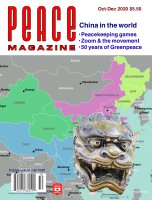
Peace Magazine Oct-Dec 2020, page 10. Some rights reserved.
Search for other articles by Peter Baehr here
Hong Kong’s 7.5 million inhabitants are now fully enmeshed in the People’s Republic of China (PRC). This is not how it was supposed to be, at least not so soon.
For over 150 years Hong Kong was a British colony. Though never fully democratic, it was an oasis of security and freedom. Mainlanders fled to Hong Kong during the Chinese civil war of the 1940s and afterwards. In the decades that followed, Chairman Mao Zedong launched the Great Leap Forward (an attempt at rapid industrialization) and the Cultural Revolution (an attempt to re-radicalize the Party and society). Purges, executions, and man-made famines killed millions. Hong Kongers escaped the worst by living in a British colony. Let that paradox sink in.
In the 1980s the British and the Chinese Communist Party agreed that Hong Kong would be returned to China on July 1st, 1997 as a semi-autonomous region. Until 2047 the city would retain a free press, a mostly elected legislature, a capitalist economy, and a legal system based on Britain’s common law.
But the compromise was fragile. Hong Kongers, especially the young, could never accept dictatorship’s creeping controls over the city. Under a new president, Xi Jinping, the Party pushed back with an unequal power-struggle. After a year of protest (June 2019-June 2020), the Party imposed a National Security law on Hong Kong that outlined the crimes of subversion, secession, terrorism, and collusion with foreign entities. Those found guilty of such crimes, including foreign nationals, face the prospect of life in prison. Beijing also stationed its own security forces on Hong Kong soil, empowered to search and arrest.
The mainlanders are accustomed to Communist rule. Coercion and anti-Western propaganda (incorrectly described as “nationalism”) are combined with the carrots of material incentives and freedom to travel. Millions do back Party rule. But in Hong Kong there is minimal support for the Communist Party. Hong Kong’s political, civic, and legal traditions are at loggerheads with it.
These traditions are now under attack. Books by “localist” leaders such as Joshua Wong are being removed from Hong Kong public libraries. Police are raiding the offices of opposition parties and making arrests under the new National Security law. High profile protesters are deleting their Facebook accounts to avoid prosecution. The bustle of street life continues, if crimped by Covid-19, but Hong Kongers are vulnerable to arbitrary arrest and detention. A pall of fear hangs over the city.
After a year of protest much of the resistance is exhausted. At its most articulate, the movement demanded full democracy in Hong Kong, a regime analogous to that of Britain and Canada. Early protests were peaceful, garnering huge numbers. In Hong Kong’s largest street demonstration ever, on June 16, 2019, two million persons—more than one-quarter of the city—opposed an extradition bill (later withdrawn by the Hong Kong government) that would have let them be brought to the Mainland for trial.
But soon thereafter, violent battles began between protesters and police. Radical protesters vandalized stores associated with mainland businesses and torched Metro stations. Mandarin speakers (the official language of China) were afraid to talk in public lest they be set upon. Fringe elements within the movement turned on each other, replicating the totalitarian language of hatred, conspiracy, and denunciation characteristic of a Communist regime. A lesson for the Canadian peace movement is to avoid such fanaticism. People who disagree with us are not, thereby, our enemies.
Yet I am struck by the nobility of a movement that defended its freedoms as long as it could. Never underestimate the organization they are facing. China is the most violent, ruthless, and predatory regime in the world.
The Party kidnaps, “disappears,” and tortures whomever it pleases; engages in mass sterilization and internment of its own citizens; steals intellectual property on an unprecedented scale; secretes spies into Western universities, labs and tech companies; and seeks to implant its 5G network into the West’s information infrastructure. And as Canadians are aware, it takes hostages (the “two Michaels”) to further its policy goals.
It is this state which now controls Hong Kong.
Peter Baehr is Research Professor in Social Theory, Lingnan University (Hong Kong).

Peace Magazine Oct-Dec 2020, page 10. Some rights reserved.
Search for other articles by Peter Baehr here